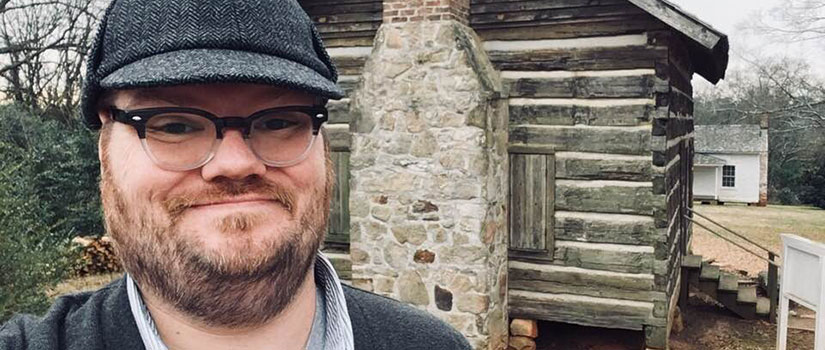Posted January 5, 2018
Ron Stafford, MLIS ’17, is a library digitization technician for Mauney Memorial Library in Kings Mountain, North Carolina.
What do you do in your current job?
Mauney Memorial Library and Kings Mountain Historical Museum wrote an LSTA (Library
Services and Technology Act) grant to digitize the archival holdings of both institutions.
It is very satisfying to know the work I am doing allows people to access vital historical
documents. The work has been challenging. My coworker and I have built the project
from the ground up. We had to write digitization standards and procedures, metadata
standards and even set up networks. There is a great sense of pride in knowing I am
doing valuable work that will benefit many people.
What’s the most interesting or significant thing you’ve done since graduating?
It has not really hit me that I have graduated yet. I still wake up every morning
and catch myself thinking I have a paper to write, or a Blackboard post to complete.
I am continuing with the goal I set for myself at SLIS to ensure information is readily
available to the public. I am very aware of information access issues and the digital
divide. The information I am creating is being hosted by DigitalNC and can be accessed
by anyone. I have grown to love Kings Mountain and her people. Her story is rich and
deeply tied to the American story, and it is very rewarding to digitally preserve,
present and provide access to the community’s history. As the project progresses,
our work will be used to present curated stories of life in Kings Mountain on DigitalKm.org.
What are you passionate about in your work?
Preservation of the collection is what I am passionate about. This goes beyond the
preservation of the analog item. My focus and passion is digital curation and information
access. I cannot stress enough that access to information is the bedrock of my LIS
philosophy. Daily, I am handling 100-plus year-old photographs, letters and postcards.
My favorite are the letters and diaries from all major U.S. military conflicts. These
are not just documents but the memories of a life, of a person that lived, breathed,
loved and made an impact on the world. We tend to get bogged down in the paper aspect
of archives. We don’t see our collections as the representation of a person’s life.
Working in a small community museum, I get to trace the lives of people through the
documents they leave behind. I have held in my hands a baptismal certificate, a high
school diploma, an honorable discharge and a death certificate for a person. It is
very easy to stop seeing these as paper and instead as a person’s life in my hands.
I am helping to preserve and tell their story. What could be better than that?
What did you learn while in school at the CIC that still resonates today?
Information access and preservation! The importance of providing digital access to
documents is a lesson that will remain with me for life. Archivists are the keepers
of history in many ways. It is in our power to share or limit knowledge. Conversations
in SLIS 777 with Dr. Lewis shaped my view on access to documents. I see my role as
a digital archivist to know and preserve my collection, advise researchers, and ensure
records are current and saved in the correct format. My role is not to shape history
by highlighting one narrative over another. I am a huge fan of DigitalNC for this
reason. DigitalNC acts as a host site where there is no curation, bias or history
writing. It is a simple platform to host and access information. DigitalNC runs on
a huge grant from IMLS (the Institute of Museum and Library Services).
Do you have a favorite professor or a favorite memory from your time at the CIC?
YES, the MOST AWESOME Dr. Elise Lewis. I would not be as successful as I have been without Elise. She is a huge source
of encouragement. A favorite memory would be going to lunch with fellow students in
Elise’s SLIS 777 class. Having class from 10 a.m. to 4 p.m. every third Friday was
a long day. It was also nice to walk together to lunch, develop bonds and network.
